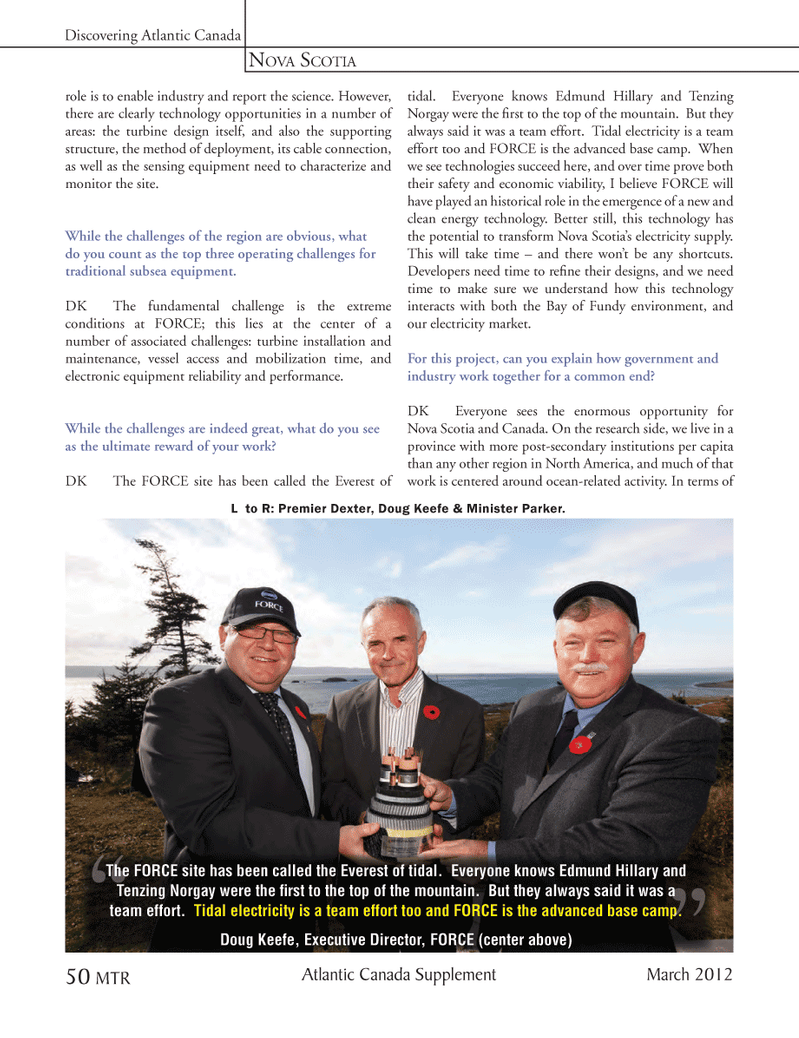
Page 50: of Marine Technology Magazine (March 2012)
Subsea Vehicle Report – Unmanned Underwater Systems
Read this page in Pdf, Flash or Html5 edition of March 2012 Marine Technology Magazine
Atlantic Canada Supplement50 MTRMarch 2012 Discovering Atlantic Canada NOVA SCOTIA role is to enable industry and report the science. However, there are clearly technology opportunities in a number of areas: the turbine design itself, and also the supporting structure, the method of deployment, its cable connection, as well as the sensing equipment need to characterize and monitor the site.While the challenges of the region are obvious, what do you count as the top three operating challenges for traditional subsea equipment.DK The fundamental challenge is the extreme conditions at FORCE; this lies at the center of a number of associated challenges: turbine installation and maintenance, vessel access and mobilization time, and electronic equipment reliability and performance. While the challenges are indeed great, what do you see as the ultimate reward of your work? DK The FORCE site has been called the Everest of tidal. Everyone knows Edmund Hillary and Tenzing Norgay were the Þ rst to the top of the mountain. But they always said it was a team effort. Tidal electricity is a team effort too and FORCE is the advanced base camp. When we see technologies succeed here, and over time prove both their safety and economic viability, I believe FORCE will have played an historical role in the emergence of a new and clean energy technology. Better still, this technology has the potential to transform Nova ScotiaÕs electricity supply. This will take time Ð and there wonÕt be any shortcuts. Developers need time to reÞ ne their designs, and we need time to make sure we understand how this technology interacts with both the Bay of Fundy environment, and our electricity market. For this project, can you explain how government and industry work together for a common end? DK Everyone sees the enormous opportunity for Nova Scotia and Canada. On the research side, we live in a province with more post-secondary institutions per capita than any other region in North America, and much of that work is centered around ocean-related activity. In terms of L to R: Premier Dexter, Doug Keefe & Minister Parker. The FORCE site has been called the Everest of tidal. Everyone knows Edmund Hillary and Tenzing Norgay were the Þ rst to the top of the mountain. But they always said it was a team effort. Tidal electricity is a team effort too and FORCE is the advanced base camp. Doug Keefe, Executive Director, FORCE (center above) a a p.p.TheTheMTR2 Canada Supplement 49-64.indd 50MTR2 Canada Supplement 49-64.indd 502/23/2012 10:17:11 AM2/23/2012 10:17:11 AM

 49
49

 51
51
